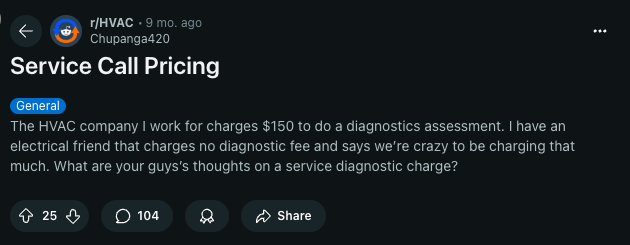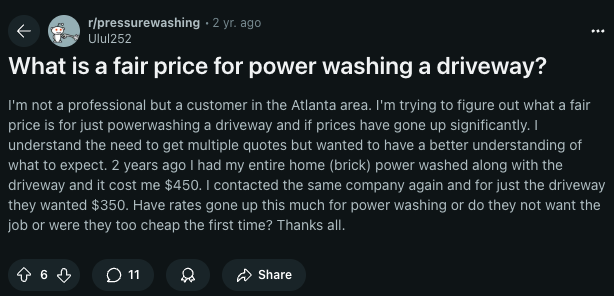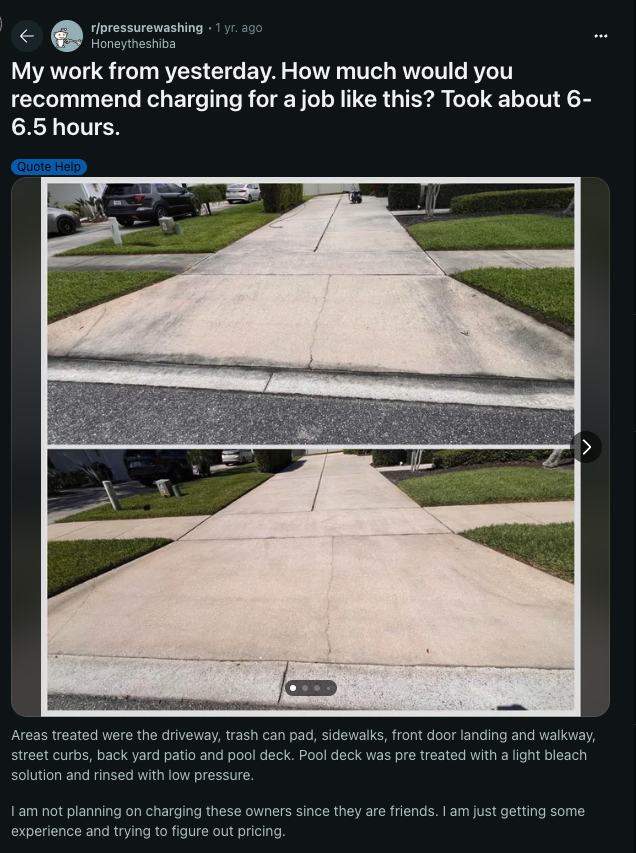Home Service Pricing: The Reddit Blueprint to Stop Guessing & Boost Profits
October 7, 2025

Tired of guessing what to charge? You're not alone.
We've seen countless home service pros on Reddit asking the same thing: "Am I charging enough?" and "How do I get more jobs?" This guide cuts through the noise.
We've pulled the best insights from real-world pros and combined them with proven strategies. You'll learn to price confidently, boost your profits, and consistently land new customers. Stop leaving money on the table. It's time to make every job count and grow your lead pipeline.
TL;DR
The Real Cost of Guesswork: Why Your Pricing Strategy is Your Best Lead Generator (or Your Biggest Leak)
It might sound counterintuitive, but your pricing isn't just about the money you collect, it’s a critical part of how you attract new customers and build a thriving business. Many solo home service pros fall into the trap of underpricing, thinking it will win them more jobs. But often, it just means you work harder for less, and potential customers might even see a super low price as a red flag, making them question the quality of your work.
Proper pricing gives you the financial stability to invest in your business, improve your service, and yes, even make your marketing efforts actually work. If you're constantly barely breaking even, how can you afford the tools or systems that help you get more leads and turn one-time customers into repeat business?
Common Pricing Traps That Steal Your Profit and Block New Leads
- The "Busyness Trap": "We're too busy to change how we do things." But are you busy doing profitable work that sets you up for future leads, or are you just busy treading water?
- Leaving Money on the Table: Every time you underprice, you’re essentially giving away your hard-earned time and expertise for free. That's money that could go towards new equipment, better training, or even a well-deserved day off. To see how much revenue you might be leaking, try our free 60-Second Revenue Leak Calculator.
- Missing Out on Quality Leads: Customers who prioritize the absolute lowest price often aren't the ones who value quality service, give great reviews, or provide referrals. You want to attract clients who understand value, not just cost.
- The "Risky to Try Something New" Objection: Sticking to old, unprofitable pricing methods is the real risk. New, efficient systems like Reputigo are proven to help businesses like yours grow without complex overhauls. Learn more about how Reputigo acts as your Growth Assistant.
Straight Talk from the Field: Real Pricing Questions from Service Pros on Reddit and What They Mean for Your Earnings
When we looked at what home service pros are really asking online about pricing, a few common themes popped up again and again. Let's dive into some of those specific questions and give you the straightforward answers you need to price with confidence and attract more customers.

"What is a fair price for an HVAC capacitor? ...is that enough or too much even?" – r/ProHVACR
This new HVAC business owner quickly realized local shops were charging closer to $375 for the same part and labor, while they were at $185. This perfectly illustrates the struggle with parts markups and valuing your expertise.
A "fair" price isn't just low, iit's one that fully covers your time, materials, equipment wear, travel, and still leaves a healthy profit. If you're consistently the cheapest, you might attract bargain hunters, but you won't build a sustainable business that generates quality leads and repeat customers. Your expertise in diagnosing and installing that part is worth far more than its sticker price. Price for value, not just cost, to ensure you can invest in your business and keep the leads coming.

HVAC diagnostic fee: "What are your guys’ thoughts on a service diagnostic charge?" – r/HVAC
This thread debates the common practice of charging a diagnostic fee ($150 in this case) versus offering free estimates, with some fearing they'll lose jobs by charging for arrival/troubleshooting time.
Your time, fuel, and expertise in troubleshooting are valuable, even if you don't perform a repair immediately. A diagnostic fee ensures you're compensated for your valuable time and weeds out tire-kickers. Being transparent about this fee builds trust with serious customers, leading to more accepted quotes and a more efficient lead qualification process.

Teen window-cleaning rates: "what should I charge for them in my area?" & "My price right now is $27.50 for all windows but I would want to have a price per window… I need help." – r/WindowCleaning
These questions show the struggle with defining clear, scalable pricing units beyond vague "small/medium/large" categories or unsustainably low flat rates. The need for per-window or per-pane pricing is clear.
Vague pricing leads to lost money and confused customers. Whether it's windows, square footage for pressure washing, or linear feet for fencing, establish clear, objective pricing units. Moving from a flat, generalized rate to a per-unit or tiered system ensures you're compensated accurately for every bit of work, reduces disputes, and builds the trust that leads to positive reviews and new customer referrals. You can use our free Service Price Calculator to determine what your rates should be.

Driveway pressure-wash pricing from a homeowner "wondering if rates 'have gone up this much.'" – r/pressurewashing
A homeowner's shock at a higher quote for a driveway compared to two years prior, highlighting the customer's perception of rising costs.
Yes, rates have gone up – your costs (fuel, equipment, insurance, your time) have increased significantly. Be prepared to explain this politely. More importantly, emphasize the value you provide: protecting their property, enhancing curb appeal, and saving them time and effort. Confidently quoting a fair, profitable price, even if higher than "expected," attracts customers who value professional service, not just the lowest bid. These are the clients who will leave 5-star reviews and refer you.
Driveway pricing for new pressure washing biz: "what is a good price to charge per [square] foot?" – r/pressurewashing
Newcomers often jump into pressure washing with passion but little understanding of the numbers, desperate for a simple number per square foot.
While per-square-foot pricing is standard and clear, simply picking a number off Reddit won't make you profitable.
You must calculate your true costs (including insurance, equipment maintenance, fuel, and your time per job) and add a healthy profit margin before you even think about competitive rates. Try to establish a minimum job fee to cover your travel and setup, preventing unprofitable small gigs. Professional, consistent pricing tells potential customers you're serious and worth investing in. Our free Service Price Calculator can help you figure out if a job is truly worth your time.

"My work from yesterday. How much would you recommend charging for a job like this? Took about 6-6.5 hours." – r/pressurewashing
This pressure washing pro, after putting in a solid 6-6.5 hours of work, is still unsure if they charged correctly or maximized their earnings. This perfectly captures the uncertainty many 1-2 person crews face – you do the work, but did you get paid what you're truly worth, and enough to keep generating new leads?
This scenario is common across all trades. If a job takes you 6-7 hours, you're not just selling time; you're selling expertise, efficiency, and the result. Aim for a target hourly rate (e.g., $100-$200/hour of actual work time, not just what the customer sees), which, for a 6-hour job, would mean $600-$1200. This rate needs to cover your operational costs (insurance, fuel, equipment wear, advertising) and leave a healthy profit.
Underprice this kind of job, and you'll be too busy working to barely break even, with no resources left to attract your next customer or stay afloat for the years ahead.

"How much does a handyman typically charge per hour?" – r/handyman
A straightforward question, but the comments revealed a complex answer: it varies wildly by location, skill, and how the fee is structured (trip fees, minimums, per-job bids).
While an hourly rate is a good starting point, a simple "per hour" charge often doesn't capture all your costs.
Combine your hourly rate with a trip fee or a minimum service charge (e.g., a 2-hour minimum). For many tasks, quoting a fixed price for the entire job is often better for both you and the customer, providing cost certainty and allowing you to bake in all your overhead and profit without them scrutinizing every minute.
This structured pricing ensures profitability and professionalism, attracting higher-quality leads.
For regions where you have customers who can pay a little more, offer a value-based rate so you capture the upside from homeowners with an appetite for more connivence than others.
"Commercial window-cleaning bid… Help! What would you charge?"– r/WindowCleaning
A window cleaner's first big commercial bid, with difficult-to reach interiors and a monthly contract. This is intimidating when you're used to residential jobs.
Commercial bids require meticulous detail. Factor in difficult access, frequency, and your long-term operational costs. Don't just multiply a residential rate. These contracts can unlock significant recurring revenue and stable cash flow, freeing you up to focus on acquiring new residential customers or expanding your service offerings.
Successfully bidding and executing commercial jobs builds significant credibility and provides valuable testimonials, opening doors to more large-scale opportunities and referrals.
Your Blueprint for Profitable Pricing
While Reddit offers valuable peer advice, truly mastering your pricing for profitability and growth requires a systematic approach. This isn't just about covering costs, it's about actively driving business growth and lead generation for your home service business.
Step 1: Calculate Your True Costs (Don't Forget the Hidden Ones!)
- Direct Costs: What does each job directly cost you? (e.g., materials for a repair, cleaning solutions, water usage, fuel for that specific job, dumping fees, subcontractor costs).
- Overhead Costs: These are the "silent killers" if not accounted for. Think about your business insurance, vehicle maintenance, tool replacement, marketing efforts, phone bills, professional development, and your own consistent wage. Tally these monthly expenses, then divide by your average number of jobs or billable hours to get a realistic per-job overhead cost.
- Your Time is Gold: How much is your time actually worth? Factor in not just the hands-on work time, but also travel to and from the site, setup, teardown, quoting, invoicing, and customer communication. Every minute you spend on a job needs to be accounted for.
Step 2: Choose Your Pricing Model (and When to Mix It Up)
- Flat Rate per Project/Service: Ideal for well-defined jobs with predictable scope (e.g., a standard water heater installation, cleaning a specific room, pressure washing a standard driveway). Customers love knowing the exact price upfront.
- Key Argument: Provides cost certainty for the customer and allows you to bake in all your costs and desired profit.
- Per Unit/Linear Foot/Square Foot: Best for services where quantity varies (e.g., window cleaning per pane, landscaping per square foot, fence installation per linear foot, carpet cleaning per room). This is transparent and scalable.
- Key Argument: Ensures you're compensated accurately for the exact amount of work, reducing disputes and building trust.
- Hourly Rate (with caution): Best for unpredictable jobs, complex troubleshooting, or specialized tasks where the scope isn't fully clear upfront (e.g., diagnostic work, custom handyman projects).
- Key Argument: Ensures you're paid for all time spent, but requires clear communication with the customer about potential time ranges. Always pair with a minimum charge.
Step 3: Add Your Profit Margin
- You're not just covering costs; you're building a sustainable business that can acquire new customers. A healthy profit margin (often 20-30% or more, depending on your market and competition) allows you to reinvest in better equipment, enhance your skills, and effectively market to new leads.
- The Formula: (Total Costs per Job + Desired Profit) = Your Price. Don't be afraid to charge what you're worth.
Step 4: Don't Forget the Minimums, Trip Fees, and Upsells
- Minimum Job Charge/Trip Fee: This is non-negotiable for a profitable home service business. It covers your basic operational costs even for small jobs, preventing you from losing money on quick gigs that take up valuable time and fuel. This is a common pain point on Reddit threads – don't fall into the trap of unprofitable small jobs.
- Add-ons & Upsells: Offer clear pricing for additional services or upgrades. For a pressure washer, it might be rust removal or concrete sealing; for a plumber, it could be a water filtration system. These boost your average job value and directly increase your revenue per customer, maximizing the value of each lead you acquire.
In Summary: Price Smart, Earn More, Get More Customers
The home service pros on Reddit are right, pricing is tough. But it doesn't have to be a mystery. By understanding your true costs, setting smart prices, and leveraging simple, powerful tools like Reputigo to :
- Estimate with confidence, every time.
- Ensure every job is profitable.
- Convert more quotes into booked work.
- Generate new leads and customers effortlessly.
- Build a reputation that drives referrals and repeat business.
You can work smarter, not harder, to put more money in your pocket and consistently grow your home service business year over year. Experience the magic of compounding and the benefit of getting pricing and profit right with our job profit compounding calculator.
If you're ready to stop guessing and start growing, discover how Reputigo helps you close more jobs and bring in new customers every week. We will support you in your journey and along the way, help you earn more.
FAQs
How much does Reputigo cost?
You can affordably collect reviews with Reputigo. The platform offers a $0 forever free tier.
For more advanced features, we have clear, flat-rate plans that start at $14.95 per month - less than 50 cents a day. These upgraded plans let you send SMS, personalize messages, and automatically follow-up on reviews so you get more.
For more advanced features, we have clear, flat-rate plans that start at $14.95 per month - less than 50 cents a day. These upgraded plans let you send SMS, personalize messages, and automatically follow-up on reviews so you get more.





















